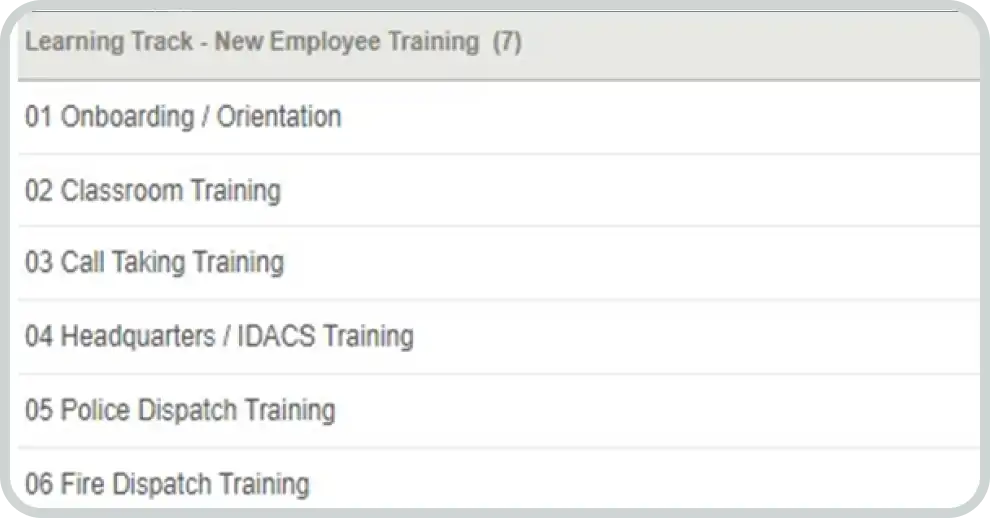February 2, 2024 min read

AEC Certification Training for the Modern Workforce
Industry:
Solution:

Many architecture, engineering, and construction (AEC) employees have professional certifications they maintain. But did you know that providing AEC certification training can help set your firm apart from the competition? Over half of architects and engineers are considering quitting—with many saying it’s because they aren’t receiving enough growth and development opportunities. Turn this trend around by learning what certifications matter to your staff and providing the proper training.
What is an Architecture, Engineering, and Construction (AEC) Certification?
Architects, engineers, and project managers all need continuing education (CE) to renew their license. Every state has different requirements regarding how many hours of training they need each year and on what topics to renew their license.

But many licensed professionals are also part of professional organizations and maintain various AEC certifications to show that they have expertise in their field.
PRO TIP: You can easily search for courses to fulfill multiple licenses with our License Requirements tool.
Types of AEC Certifications
AEC is a diverse industry, spanning from the design of buildings and projects to the actual construction and management of them. Therefore, there are numerous different certifications AEC professionals can have. These include:
1. Architecture Certifications
- American Institute of Architects (AIA)
- Green Building Certification Institute (GBCI): LEED Accredited Professional and LEED Green Associate
- Landscape Architecture Continuing Education System (LA CES)
- Building Performance Institute (BPI)
2. Design Certifications
- Interior Design Continuing Education Council (IDCEC)
- National Council for Interior Design Qualification (NCIDQ)
- Council for Interior Design Accreditation (CIDA)
3. Engineering Certifications
- Board of Professional Engineers
- Professional Engineer (PE) for Electrical, Mechanical, Fire, Plumbing, and Civil Engineers
4. Construction Certifications
- Construction Management Association of America: Certified Construction Manager (CCM)
- National Association of State Contractor Licensing Agencies (NASCLA)
5. Project Management Certifications
- Management Institute (PMI): Project Management Professional (PMP®) and Agile Certified Professionals (PMI-ACP®)
Interested in providing accredited training for any of these credentials and licenses? Vector Solutions provides eLearning courses to fulfill all these AEC certifications and more!
“We have a lot of professionals who are licensed in eight states. If we didn’t have Vector Solutions, they would spend half their career traveling and attending outside continuing education sessions.”
'- Christina Urciuoli
HR & Training Specialist, Maser
Why You Should Invest in AEC Certification Training
Many AEC professionals are going to be interested in holding various certifications in addition to their license. So, why should you, as an employer, provide that training for them?
Investing in employee training to facilitate these certifications is a strategic move that pays dividends. Here’s why providing the necessary training for AEC certifications is a key investment for your long-term business success:
1. Elevated Expertise
Professional certifications are designed to hone and validate specific skills crucial to the industry. By offering training programs that align with these certifications, employers empower their workforce to deepen their expertise.
Whether it’s mastering the latest project management methodologies, staying abreast of sustainable design principles, or excelling in specialized engineering domains, certified professionals contribute to projects with heightened competence.
2. Competitive Edge
In a sector where innovation and excellence are paramount, having a team with recognized certifications provides a competitive edge. Clients and stakeholders often seek assurance in the form of certified professionals who bring not only theoretical knowledge but a practical understanding of industry best practices.
Offering training for certifications ensures that your team remains at the forefront of advancements, positioning your firm as the go-to partner for cutting-edge and high-quality work. BONUS: This will also make it easier to hire and retain staff!
3. Adapting to Evolving Industry Standards
The AEC industry is growing and changing rapidly. Regulatory and accredited bodies keep up with the times and change their certification requirements accordingly. Because of that, employees who maintain these certifications signal that they are keeping up with best practices and industry changes. 
AEC Certification Training: What Do You Need?
Are you ready to start providing training so your workforce can maintain their professional licenses and credentials? But are you also not sure where to start?
There are a few things you need out of a training solution:
- A variety of content. Regardless of your company makeup (e.g., focused on architecture and engineering or construction, or all three!), most certifications require individuals to learn about a variety of different topics. Not to mention, your staff also need to fulfill their continuing education units, too. So, look for a partner that has a large library of eLearning.
- A team of experts. The industry is constantly evolving, so you’ll want to look for a partner who has a team of subject matter experts to provide the latest best practices and information.
The Cost of Maintaining an AEC Certification
Continuing education for architects and engineers is required, and it can come at a cost.
Engineers and architects are already required to complete continuing education units (CEUs) to maintain their license. And, often, any other certification they have adds requirements on top of that.
For example, AIA requires 18 hours of continuing education every year and WELL AP requires 30 hours every two years.
If you let your employees manage their own AEC certifications, which you then reimburse, the costs can add up. The average cost of a single hour of engineering training is about $30 and architect training is about $20. If most engineers need 15 hours of training each year and most architects need 12 hours every year, the costs per employee are quite high. And that does not include in-person training or attending industry events.
These costs can decrease if you decide to centralize training and/or bundle your training and safety management tools.

The AEC Certification Training Vector Solutions Provides
Vector Solutions believes in supporting architects, engineers, contractors, and project managers throughout their careers. Each AEC certification is an important milestone and signifies that your employees and business take industry best practices and regulations seriously.
Download our course catalog to learn more about the credentials, licenses, and accrediting bodies we work with and how it can benefit your organization.
Industry-Leading Online Course Library for AEC Firms
With numerous accredited courses, we help AEC professionals maintain a variety licenses and certifications
View Library
If you are ready to provide training to help your workforce fulfill their certification requirements, request a demo today to learn more about our AEC eLearning courses.








